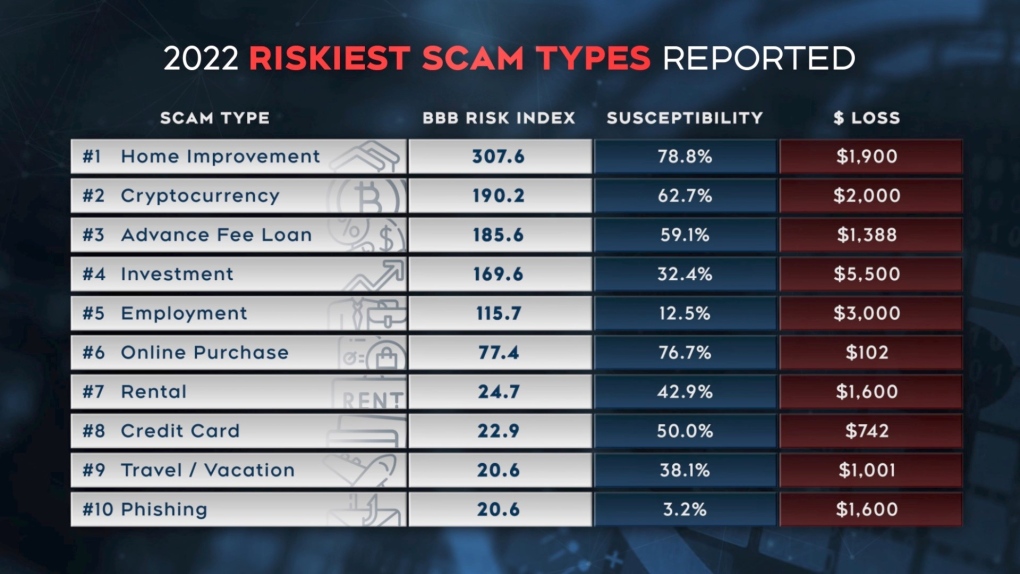The top 10 riskiest scams for Canadians to watch out for
The Better Business Bureau has released its list of the top 10 riskiest scams in Canada.
Home improvement scams top the BBB's risk index, followed by cryptocurrency scams and advance fee loans.
"Home improvement scams were the riskiest scam reported because you can lose a lot of money. There's a lot involved with that," explained Melanie McGovern, International Assoc. of BBB Director of PR.
The BBB also says that younger people are being scammed more often.
"It’s not older people who are losing money to scams, it's 18-to-24-year-olds," said McGovern. "So, have that conversation with your kids about safety online. They grew up with the internet. It's not something that is scary to them."
Rounding out The Better Business Bureau's top five scams of 2022 are investment scams, and employment scams. Online purchase scams, rental fraud, credit card scams, travel scams, and phishing complete the top 10.
 The top 10 riskiest scams in Canada in 2022, according to the Better Business Bureau. (CTV News Ottawa)
The top 10 riskiest scams in Canada in 2022, according to the Better Business Bureau. (CTV News Ottawa)
To protect yourself, the BBB advises always using a credit card when shopping online, as they offer built-in fraud protection. It is also recommended to avoid responding to text messages from unknown numbers or clicking links within them.
"Texting scams were up 39 per cent over 2021. So a lot of scammers are using texting as a method of contact," says McGovern.
One victim, a Bitcoin broker who goes by the alias "Mr. Bitcoinz", told CTV News he was recently scammed out of his entire Bitcoin account.
"One day I woke up, my phone didn't work. It just said no service," he said.
After visiting his phone provider, he discovered that scammers had sim-swapped his phone, giving them access to his email and exchange account. With access to all of his information, the scammers were able to steal all of his Bitcoin, totaling 10 coins, which had an approximate value of $200,000 CAD.
"It's just gone in a blink of an eye," Mr. Bitcoinz said.
Sim-swaps, while not on the BBB's list, are a type of scam that usually follows a phishing scam, where fraudsters use deceptive links or other tricks to get personal information, and then contact victims' service providers to impersonate them and gain access to their phone data.
Mr. Bitcoinz says investing in cryptocurrency can be a risky game.
"You can't reverse the money. Once the money has been sent, nobody can get the money back. It's irreversible," he said.
CTVNews.ca Top Stories

Richard Perry, record producer behind 'You're So Vain' and other hits, dies at 82
Richard Perry, a hitmaking record producer with a flair for both standards and contemporary sounds whose many successes included Carly Simon’s 'You’re So Vain,' Rod Stewart’s 'The Great American Songbook' series and a Ringo Starr album featuring all four Beatles, died Tuesday. He was 82.
Hong Kong police issue arrest warrants and bounties for six activists including two Canadians
Hong Kong police on Tuesday announced a fresh round of arrest warrants for six activists based overseas, with bounties set at $1 million Hong Kong dollars for information leading to their arrests.
Read Trudeau's Christmas message
Prime Minister Justin Trudeau issued his Christmas message on Tuesday. Here is his message in full.
Stunning photos show lava erupting from Hawaii's Kilauea volcano
One of the world's most active volcanoes spewed lava into the air for a second straight day on Tuesday.
Indigenous family faced discrimination in North Bay, Ont., when they were kicked off transit bus
Ontario's Human Rights Tribunal has awarded members of an Indigenous family in North Bay $15,000 each after it ruled they were victims of discrimination.
What is flagpoling? A new ban on the practice is starting to take effect
Immigration measures announced as part of Canada's border response to president-elect Donald Trump's 25 per cent tariff threat are starting to be implemented, beginning with a ban on what's known as 'flagpoling.'
Dismiss Trump taunts, expert says after 'churlish' social media posts about Canada
U.S. president-elect Donald Trump and those in his corner continue to send out strong messages about Canada.
Heavy travel day starts with brief grounding of all American Airlines flights
American Airlines briefly grounded flights nationwide Tuesday because of a technical problem just as the Christmas travel season kicked into overdrive and winter weather threatened more potential problems for those planning to fly or drive.
King Charles III is set to focus on healthcare workers in his traditional Christmas message
King Charles III is expected to use his annual Christmas message to highlight health workers, at the end of a year in which both he and the Princess of Wales were diagnosed with cancer.

































